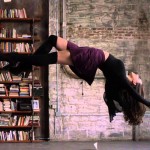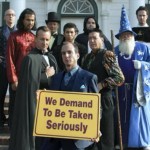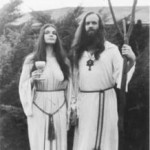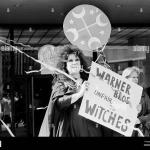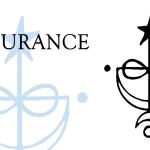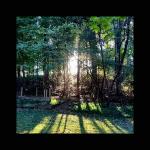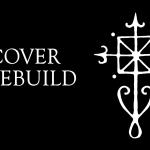At her blog, Onion Work, Ruby Sara has recently posted about the beginnings of her spiritual journey and the fascination that magic played. She denies that this fascination with magic was escapism:
And it was for magic specifically that I ached. To some, this yearning may seem the antithesis of my views regarding the need for a religion of Right Here This Body This Planet Beautiful Beautiful Right Now, rooted in the Mama, the present, the Real, with a wicked aversion to technology and anything that escapes the senses or the body [… my longing for magic] could be seen as a desire to escape this-world, to transcend or trick the mundane laws of real life…because real life isn’t beautiful or mysterious or good enough.
In my case, that’s exactly what it was. Like Ruby Sara, I was a fantasy geek in high school. My favorite books were the Dragonlance series by Margaret Weis and Tracy Hickman. And my favorite character was Raistlin, the physically weak, but magically powerful mage.
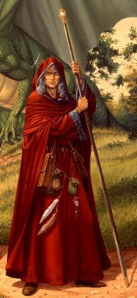
Whenever I played roleplaying games, I always played the wizard. And it was actually my interest in magic that led me to pick up Frazer’s The Golden Bough the first time (although Frazer, as it turns out, is not sympathetic to magic — pun intended). I fantasized about a world where the power of mind could compete with the power of muscle on the physical level. As I was a skinny and physically uncoordinated teen, no doubt my fantasy had something to do with my fear of (mostly imaginary) bullies. I even had a kind of mental tick which would cause me to compulsively repeat the phrase, “All I need is a little bit of magic”, when I was feeling overwhelmed. My interest in magic was definitely escapist.
One might expect, then, that I would have embraced magic as a Pagan. But nothing could be farther from the truth. In fact, I am repulsed by the very notion of magic and resent its association with Neopaganism. Magic, by which I mean, ritualized wishful thinking, which is based on the false premise that thought or intention alone can change the material world.
The most common explanation among Pagans for how magic works is that the world is permeated by a kind of spiritual energy, which is not susceptible to scientific measurement, but which can effect changes in the material world. This energy supposedly can be manipulated by focusing one’s mind or will toward an intended goal. Sometimes, invocations of “chaos theory” or Heisenberg’s Uncertainty Principle are thrown in to smooth over any perceived logical gaps. I’m not going to go into why all this is nonsense to me. If you believe in it, I’m not going to convince you otherwise. And if you don’t, then I don’t need to convince you.
What I do want to discuss is why what I call “instrumental magic” is antithetical to the Neopagan ethos. First, what is this Neopagan ethos? Robert Ellwood and Harry Partin describe this in their book Religious and Spiritual Groups in Modern America:
“The unifying theme among the diverse Neo-Pagan traditions is the ecology of one’s relation to nature and to the various parts of one’s self. As Neo-Pagans understand it, the Judaeo-Christian tradition teaches that the human intellectual will is to have dominion over the world, and over the unruly lesser parts of the human psyche, as it, in turn, is to be subordinate to the One God and his will. The Neo-Pagans hold that, on the contrary, we must cooperate with nature and its deep forces on a basis of reverence and exchange. Of the parts of man, the imagination should be first among equals, for man’s true glory is not in what he commands, but in what he sees. What wonders he sees of nature and of himself he leaves untouched, save to glorify and celebrate them.”
Instrumental magic runs counter to this unifying theme of Neopaganism. The magical control of nature is in opposition to the more “religious” attitude of reverence of nature and the practice of cooperation with, rather than control over, nature which are central to the Neopagan ethos. Instrumental magic is a vestige of Neopaganism’s origin in the occult tradition. While Neo paganismis a product of the 1960‘s counterculture and the feminist movement, the form that it initially took was borrowed from British Wicca, which was a product of the Western occult Hermetic tradition.
Michael York, in his book Pagan Theology also distinguishes magic from paganism. York defines paganism (small “p”) as the “fundamental and atavistic human urge to express honor and homage.” He states:
“Worship at this nonreflective and almost spontaneous stage of human growth, stripped of its theological overlay or baggage ad expressive of the root level of religion, is what I am identifying as pagan.”
Against this definition, York contrasts magic. According to York, pagan (or what he also calls “cultic”) behavior “is unconscious, automatic, or reflexive” and “is natural and becomes part of the consequences that spring from any fundamental human need to worship or express veneration.” The pagan religious form “seeks nothing beyond its desire to express some form of adoration to the divine”.
In contrast, magic is undertaken with a deliberate aim in mind and its rituals are “intentional” and “consciously performed”. Says York, “Magic is the product of extreme will.” Religious ritual, York reiterates, is “natural” and works “with the organic flow and not in violation of it.” Whether magical practice can legitimately be described as violating natural law from the perspective of the magician is dubious. However, York has a point that magic seeks to change things, whereas pagan religious practice does not. According to York, in magic, sacrifice represents a payment, whereas in pagan religion, a sacrifice is a gift. Similarly, while magical rituals are attempts to coerce, York calls religious rituals “presentations”.
In 1997, Trudy Frisk published an article in Trumpeter: The Journal of Ecosophy, entitled “Paganism, Magic, and the Control of Nature”, which highlighted the conflict between magic and other Neopagan values. According to Frisk, the instrumental view of magic “perpetuates the utilitarian view of nature. Expecting natural objects to fulfill human desires leads to disregard for maintaining nature in all its complexity.” This causes Frisk to wonder:
“How does that paganism differ from monotheistic religions trumpeting their dominion over nature? … Shouldn’t we try to discover the pattern that Gaia is weaving before presuming to interfere? … Perhaps we should attune ourselves to the Earth before attempting to intervene.”
This attunement is precisely the purpose of many “non-magical” Neopagan rituals: attunement to the cycles of nature, attunement to our deeper selves, and attunement with one another. I believe that the purpose of Neopagan rituals should not be “power-over” (to borrow Starhawk’s terms) the natural world, but “power-from-within” and “power-with”.
So, how did I, a fantasy-loving geek, become a magic-hating Neopagan? Well, I suspect that Christian religion had something to do with it. When I “lost my faith” in a transcendent deity that hears people’s prayers and arbitrarily grants some and refuses others, I began to see intercessory prayer as a form of magic. Why, I thought, would I then replace one form of wish fulfillment with another? I am equally disturbed by Neopagan witchcraft spells to win love or money as I am by Christian prayers for the same.
My conversion to Paganism was more than just adding a few gods to my pantheon. It was a true paradigm shift. I no longer wanted to escape this world; I wanted to experience it more fully. I realized that it was not less of this life that I wanted; it was more. I wanted to live more intensely, with all of my senses, to feel more alive, more vital. And magic, which seemed escapist to me, had no place in this new consciousness.
But magic does have another meaning. Magic is the experience of that which makes like meaningful. Ruby Sara writes:
There’s “real life,” and then there’s Real Life, and they’re really really really NOT the same thing. Believing in and longing for magic […] is, to me, the same as the human hunger for god and the human delight in and search for true beauty…a longing for Real Life […] Magic is Beauty is Mystery is Possibility is Imagination is Amazement is Storytelling is Poetry is Enchantment is Mama is God.
To me, this “Real Life” that Ruby Sara describes is what one of the character’s in the film American Beauty calls the “life behind things”. It is what C. S. Lewis calls “that other, larger, stronger, quieter life”, and what Dietrich Bonhoeffer calls “the beyond in the midst of life”. This is the “magic” we experience when we see a sunset or a child laughing and we are compelled to say: “It’s magical.” It is not trivial, and it is not merely a poetic expression; it is an expression of one of the most meaningful human experiences, and it stands at the center of what I call Neopagansim.
This is magic that I can get down with: magic which has nothing to do with control or wish-fulfillment, magic which is about being open to life, rather than trying to mold it to our will. It is the kind of magic that is experienced through simple rituals, rituals which are rooted in the land, rituals which seek attunement with nature, rituals which celebrate of the cycles of life.
As Leonard Cohen wrote in his poem, “God is Afoot, Magic is Alive”:
Magic is no instrument
Magic is the end





